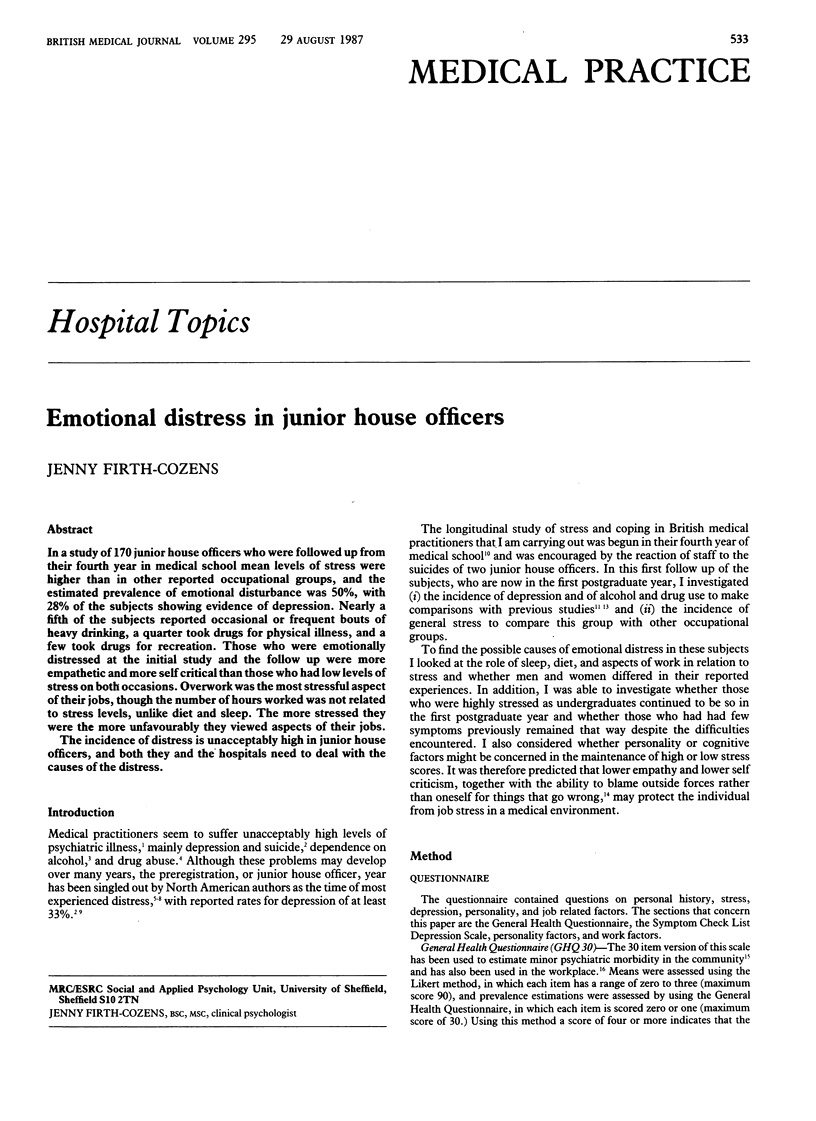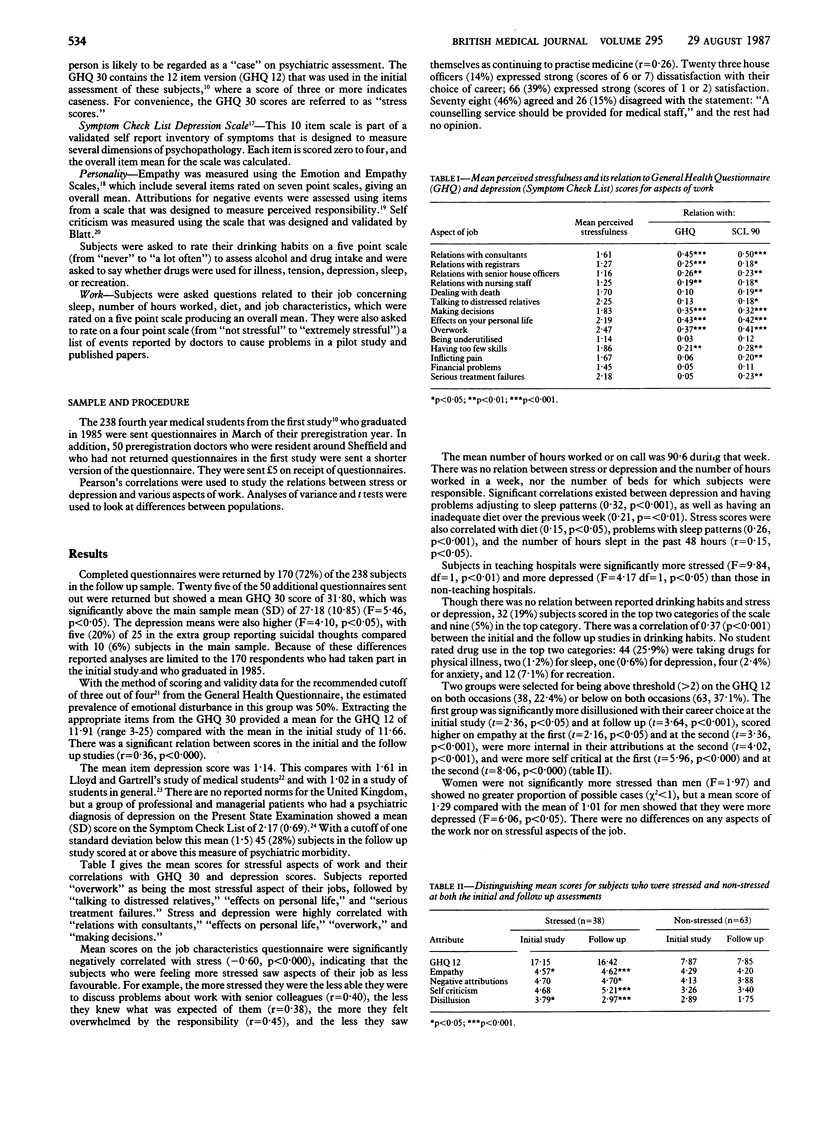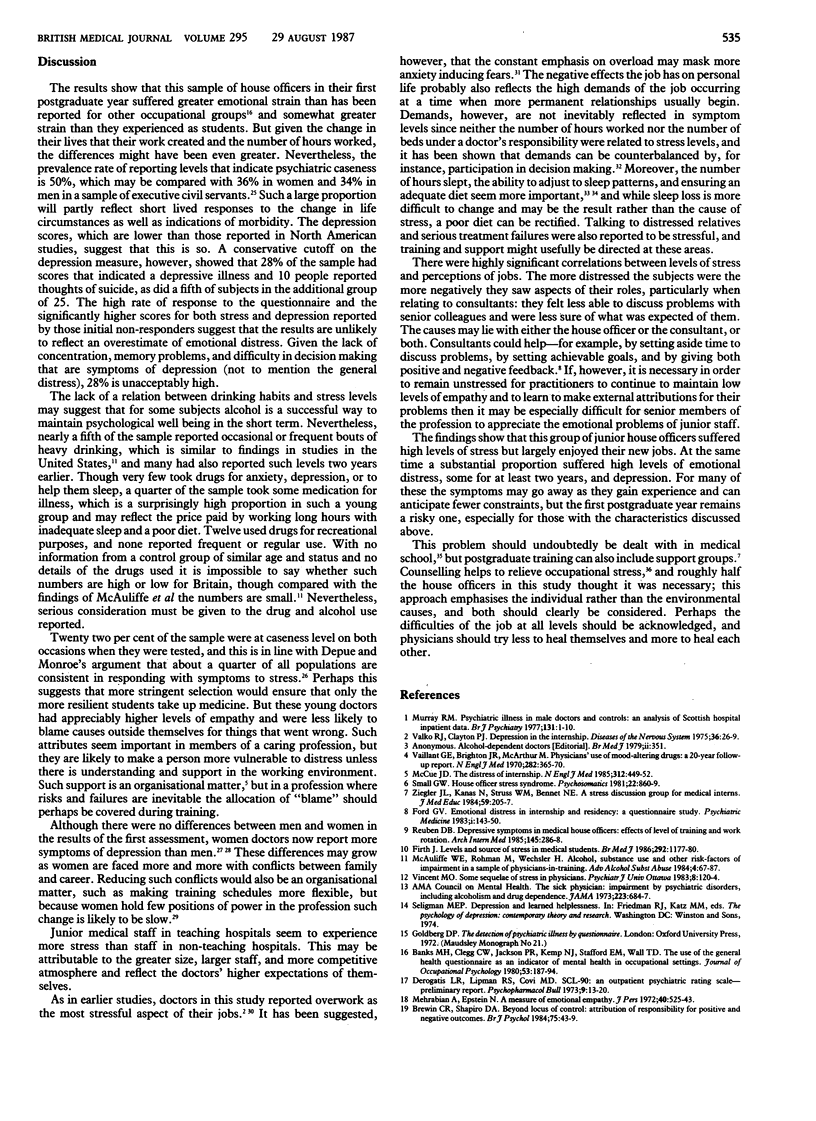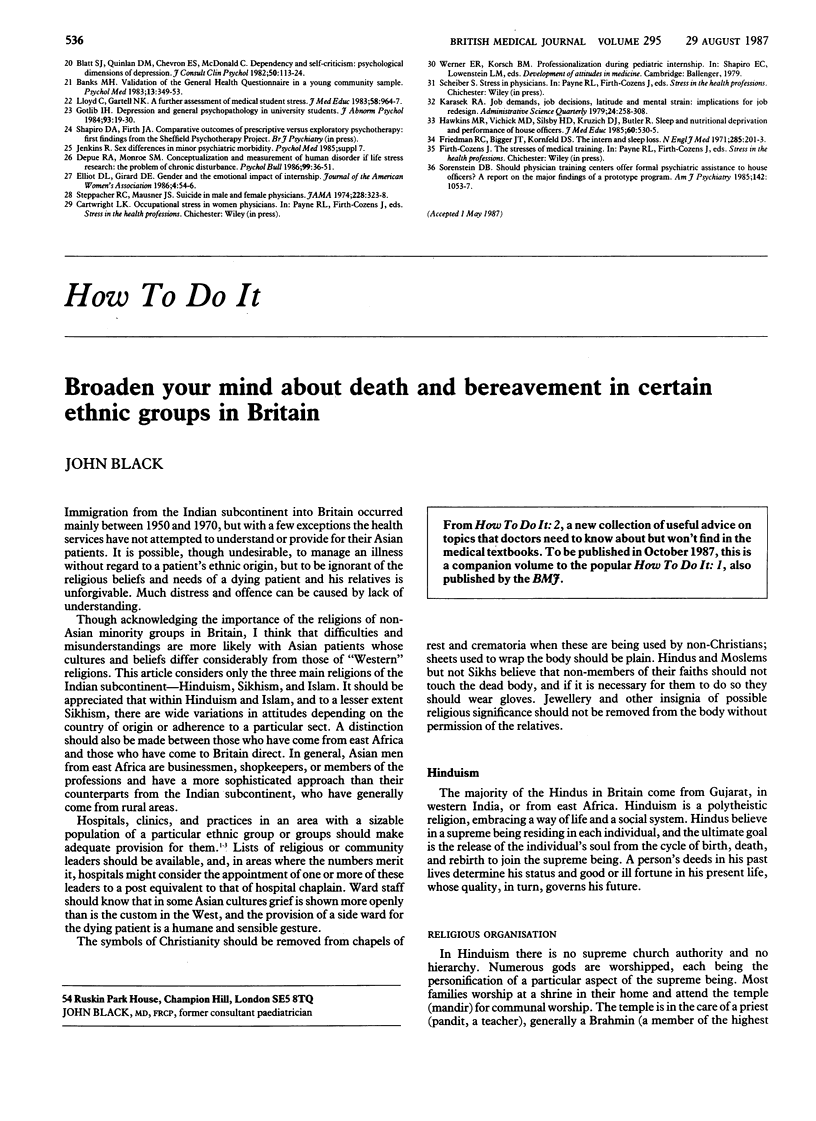Abstract
In a study of 170 junior house officers who were followed up from their fourth year in medical school mean levels of stress were higher than in other reported occupational groups, and the estimated prevalence of emotional disturbance was 50%, with 28% of the subjects showing evidence of depression. Nearly a fifth of the subjects reported occasional or frequent bouts of heavy drinking, a quarter took drugs for physical illness, and a few took drugs for recreation. Those who were emotionally distressed at the initial study and the follow up were more empathetic and more self critical than those who had low levels of stress on both occasions. Overwork was the most stressful aspect of their jobs, though the number of hours worked was not related to stress levels, unlike diet and sleep. The more stressed they were the more unfavourably they viewed aspects of their jobs. The incidence of distress is unacceptably high in junior house officers, and both they and the hospitals need to deal with the causes of the distress.
Full text
PDF



Selected References
These references are in PubMed. This may not be the complete list of references from this article.
- Banks M. H. Validation of the General Health Questionnaire in a young community sample. Psychol Med. 1983 May;13(2):349–353. doi: 10.1017/s0033291700050972. [DOI] [PubMed] [Google Scholar]
- Blatt S. J., Quinlan D. M., Chevron E. S., McDonald C., Zuroff D. Dependency and self-criticism: psychological dimensions of depression. J Consult Clin Psychol. 1982 Feb;50(1):113–124. doi: 10.1037//0022-006x.50.1.113. [DOI] [PubMed] [Google Scholar]
- Depue R. A., Monroe S. M. Conceptualization and measurement of human disorder in life stress research: the problem of chronic disturbance. Psychol Bull. 1986 Jan;99(1):36–51. [PubMed] [Google Scholar]
- Derogatis L. R., Lipman R. S., Covi L. SCL-90: an outpatient psychiatric rating scale--preliminary report. Psychopharmacol Bull. 1973 Jan;9(1):13–28. [PubMed] [Google Scholar]
- Firth J. Levels and sources of stress in medical students. Br Med J (Clin Res Ed) 1986 May 3;292(6529):1177–1180. doi: 10.1136/bmj.292.6529.1177. [DOI] [PMC free article] [PubMed] [Google Scholar]
- Ford C. V. Emotional distress in internship and residency: a questionnaire study. Psychiatr Med. 1983 Jun;1(2):143–150. [PubMed] [Google Scholar]
- Friedman R. C., Bigger J. T., Kornfeld D. S. The intern and sleep loss. N Engl J Med. 1971 Jul 22;285(4):201–203. doi: 10.1056/NEJM197107222850405. [DOI] [PubMed] [Google Scholar]
- Gotlib I. H. Depression and general psychopathology in university students. J Abnorm Psychol. 1984 Feb;93(1):19–30. doi: 10.1037//0021-843x.93.1.19. [DOI] [PubMed] [Google Scholar]
- Hawkins M. R., Vichick D. A., Silsby H. D., Kruzich D. J., Butler R. Sleep and nutritional deprivation and performance of house officers. J Med Educ. 1985 Jul;60(7):530–535. doi: 10.1097/00001888-198507000-00004. [DOI] [PubMed] [Google Scholar]
- Lloyd C., Gartrell N. K. A further assessment of medical school stress. J Med Educ. 1983 Dec;58(12):964–967. doi: 10.1097/00001888-198312000-00008. [DOI] [PubMed] [Google Scholar]
- McAuliffe W. E., Rohman M., Wechsler H. Alcohol, substance use, and other risk-factors of impairment in a sample of physicians-in-training. Adv Alcohol Subst Abuse. 1984 Winter;4(2):67–87. doi: 10.1300/J251v04n02_07. [DOI] [PubMed] [Google Scholar]
- McCue J. D. The distress of internship. Causes and prevention. N Engl J Med. 1985 Feb 14;312(7):449–452. doi: 10.1056/NEJM198502143120725. [DOI] [PubMed] [Google Scholar]
- Mehrabian A., Epstein N. A measure of emotional empathy. J Pers. 1972 Dec;40(4):525–543. doi: 10.1111/j.1467-6494.1972.tb00078.x. [DOI] [PubMed] [Google Scholar]
- Murray R. M. Psychiatric illness in male doctors and controls: an analysis of Scottish hospitals in-patient data. Br J Psychiatry. 1977 Jul;131:1–10. doi: 10.1192/bjp.131.1.1. [DOI] [PubMed] [Google Scholar]
- Reuben D. B. Depressive symptoms in medical house officers. Effects of level of training and work rotation. Arch Intern Med. 1985 Feb;145(2):286–288. [PubMed] [Google Scholar]
- Small G. W. House officer stress syndrome. Psychosomatics. 1981 Oct;22(10):860–869. doi: 10.1016/S0033-3182(81)73093-7. [DOI] [PubMed] [Google Scholar]
- Steppacher R. C., Mausner J. S. Suicide in male and female physicians. JAMA. 1974 Apr 15;228(3):323–328. [PubMed] [Google Scholar]
- Vaillant G. E., Brighton J. R., McArthur C. Physicians' use of mood-altering drugs. A 20-year follow-up report. N Engl J Med. 1970 Feb 12;282(7):365–370. doi: 10.1056/NEJM197002122820705. [DOI] [PubMed] [Google Scholar]
- Valko R. J., Clayton P. J. Depression in the internship. Dis Nerv Syst. 1975 Jan;36(1):26–29. [PubMed] [Google Scholar]
- Vincent M. O. Some sequelae of stress in physicians. Psychiatr J Univ Ott. 1983 Sep;8(3):120–124. [PubMed] [Google Scholar]
- Ziegler J. L., Kanas N., Strull W. M., Bennet N. E. A stress discussion group for medical interns. J Med Educ. 1984 Mar;59(3):205–207. doi: 10.1097/00001888-198403000-00010. [DOI] [PubMed] [Google Scholar]


